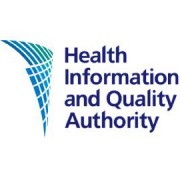The Role of HIQA in regulating Social Care Services
Large attendance at HMI West meeting

Breda Crehan-Roche, CEO, Ability West with Finbarr Colfer, HIQA
The Role of HIQAin regulating Social Care Services was the title of the presentation given by Mr. Finbarr Colfer, Inspector Manager, Social Services Inspectorate, HIQA. The meeting was chaired by Bernard Gloster, HSE, who said that the large attendance was evidence of the importance of the topic.
Finbarr commenced his presentation by setting out the legal and regulatory boundaries arising from the 2001 Healthcare Strategy and the subsequent 2007 Health Act which established the Health Information and Quality Authority (HIQA). He outlined the functions of HIQA and how this contrasted with what had pertained previously. HIQA is a statutory and independent agency, with a remit which crosses public, voluntary and private services. Being a national inspectorate which registers and regulates the provision of health and personal social services, HIQA has a range of regulatory and enforcement powers while bringing a consistent approach on a nationwide basis.
Since July 2009, all residential care settings for older people are required to be registered with HIQA in order to operate. Taking the regulation of residential care settings for older people as a template, he went on to outline key concepts, the role of standards, and the role of regulation as a useful way for those in the disability sector to prepare for a regulatory environment.

Bernard Gloster, HSE with Finbarr Colfer, HIQA

Finbarr Colfer, HIQA with Winnie Davern, Treasurer, HMI West
While the National Standards for the Disability Sector are in draft form at present, the standards will become operational in 2013 and all providers will be obliged to register with HIQA. Legislation, standards, and regulation combine to bring quality in services provided. Standards identify the quality of care, while regulation includes registration, monitoring and enforcement. He went on to distinguish in great detail, between a ‘fit person’ and a ‘person in charge’ and what is required of both. Evidence is key, Finbarr explained. Fit persons need to be able to demonstrate they know their legal responsibilities and that they are able to meet the standards as set down. Accompanying criteria set out different ways that providers can meet standards. The provider of a service can be a company/person/partnership/corporate body e.g. HSE. The person nominated to represent the provider is the ’fit person’. The ‘person in charge’ oversees the day to day management of a centre. Knowledge, training, evidence of this and of the value system which operates in the organisation are paramount. Does a centre promote the dignity of the client? Is there evidence that care and service planning are conducted in partnership with those who use the service? These are just some the questions an inspector is seeking to answer during an inspection visit.

Finbarr Colfer, HIQA with Helen O’Dwyer, GSK
At all times throughout the meeting, there was lively engagement between Finbarr and the audience, many of whom sought clarity on specific issues affecting their work. At the end of the meeting, the consensus was that the meeting was both timely and beneficial. They also appreciated the opportunity to share their experiences and concerns with their peers.




